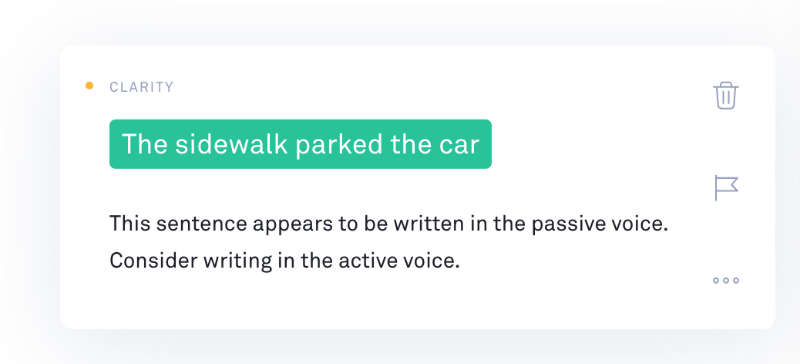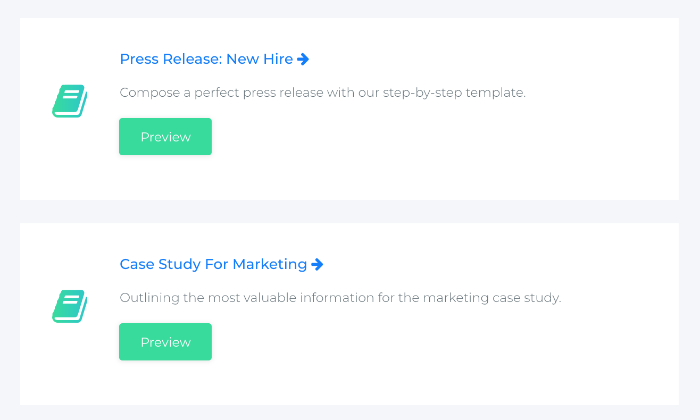Three problems of services for checking English grammar, and whether they can be solved

The grammar of the English language is not always easy, and even the most educated people from among its speakers make mistakes. Therefore, the use of specialized software to correct inaccuracies in written English seems like a good idea. It is supported by a rather aggressive advertising of leading companies in this market.
In practice, things are not so simple, and today we will talk about three main problems that users of such services may face. We will also discuss their possible solutions.
')
Robots are trying to be smarter than humans.
One of the main problems of many spell-checking tools is that they are trying to be smarter than humans, although at a given level of technology development this is difficult to achieve.
For example, one of the most well-known systems of this type Grammarly opposes the use of a passive voice. According to the algorithm, this is a bad language construct, so he suggests getting rid of it 100% of the time.
Here is how it looks in practice. Suppose you have the sentence "The car was parked by David." Most checkers will emphasize it as erroneous - of course, there is also a passive voice! Instead, a super-smart algorithm will suggest using “David parked the car”. Ok, it can be accepted. But what if your proposal sounds like “The car was parked by the sidewalk” - meaning that the car is physically parked next to some object (pavement). What will the AI-algorithm of the leading grammar checker cost $ 29.95 / month offer us?
You are welcome:

It happens when a computer tries to be smarter than a person. Online helpers should work in a less aggressive mode, not trying to be too categorical in their recommendations, be it a passive voice, use of incomplete sentences, or when they start with unions like And or But.
For example, the spelling checker built into MS Word has evolved, and now it does not so aggressively eradicate the same passive voice.
Developers do not care about privacy
Not so long ago, Facebook engineer Sebastian McKenzie raised an interesting topic: he called Grammarly the real keylogger because the service collects any information entered by the user on the Internet (except for data from restricted fields, such as windows for entering a password).
In addition, the service reserves the right to study the content of users for different purposes: from the training of the algorithm to the analysis for violation of the terms of use.
Despite the fact that claims about the desire to learn about the user as much as possible speaks employee Facebook, in his words there is some truth. Of course, it is impossible to call such grammar-checkers as keyloggers - this is not a spyware program, the user installs it himself and can disable it on specific sites.
But the desire to involve as much of your data as possible without a clear explanation of what should be done with them should be strained. It is much better for users to use tools that allow you to work in anonymous mode or have other functions to protect private information. For example, the Textly.AI service allows you to use your plugins for Chrome and Firefox without creating an account, and their web application has a mode similar to a secret chat in the browser - after logging out, all the content adjusted by the algorithm is deleted. This is a much more healthy approach.
Do not help in creating content
Another rather serious problem of many existing tools is that they focus only on correcting already written content. At the same time, there is still such a problem as the fear of a white sheet. Google gives out 29 million search results for this phrase - a lot of people suffer from it.
That is, in fact, the existing tools come into operation at a level where a huge number of people cannot reach at all. Almost none of the grammar checkers help to deal with the problem of the fear of a white sheet, and this is exactly what developers should pay attention to.
Today there are only separate initiatives in this direction on the market - the Textly.AI startup team offers users a library of templates that you can simply fill in with your data and then check for correctness:

Another example: the Ginger service offers a tool for rephrasing sentences - the user can write quite simple, and he will be given a slightly more complicated option (not exactly what is needed, but at least something).
Conclusion
Modern spelling and grammar tools can be useful. However, when choosing a tool for daily use, at least several factors should be considered:
- how developers ensure data privacy (and whether they even have such a priority),
- Is it possible to use a tool to help write content, not just for editing,
- how categorical the algorithm is, whether it gives freedom of expression or tries to drive any text into the rigid framework of the rules.
This is what I look at. What do you think, what else do you need to pay attention to?
Source: https://habr.com/ru/post/447392/
All Articles